Public Archive
A patchy record of DIY satellite imagery and weather notes since 2020. The open-weather public archive is open to everyone willing and able to contribute.
Words for Climate
An evolving set of words chosen by contributors to reflect their experiences of the climate crisis.
Filter by
Ground Station Type
Automatic Ground Stations are local, semi-permanent stations that record and upload satellite transmissions automatically once per day. Manual ground stations are DIY and often mobile; operators manually record and upload satellite transmissions.
Satellites
The archive contains Automatic Picture Transmissions (APT) by US weather satellites NOAA-15, NOAA-18 and NOAA-19.
Nowcasts
Collective earth-sensing events led by open-weather, co-produced by a network of contributors around the world.
Contributors
A list of tagged contributors only. Please contact us if you want to be added.
Automatic Ground Stations
Search
2024-04-14 22:23:46
Soph Dyer
Augarten, Wien, Austria
Austria
NOAA-18

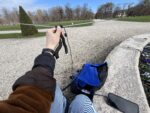
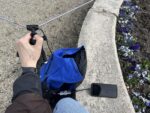
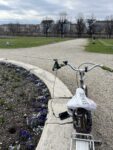
The wind has been squally, like my body. I woke tired. To reclaim my body, I swim one kilometre at the local pool. The full sensory experience of swimming focuses me on breath and rhythm, in ways other sport cannot. I feel my muscles and enjoy imagining the small exercised-induced testosterone boost. I feel back inside my body, home.
2024-06-25 12:36:45
Soph Dyer
Augarten, Wien, Vienna
Vienna
NOAA-18
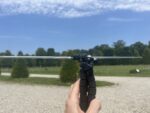
I thought that I'd overheat but cloud came between me and the sun. It's hot, but not too hot, and the heat is dry. I feel more at peace in my body today. I know that I need to listen to it and respect its limits while it heals. The city building's are no longer cooler inside than out. I am trying to be productive, get work done, but really I want to be lying flat on my bed or dipping in the cool waters of the Danube. How are you Sasha?
2024-06-14 11:36:59
Soph Dyer, Nicola Locatelli
Stefy & C. Market Di Gallizia S. e Valent S. Snc, Moggio di Sotto, Italy
Italy
NOAA-18

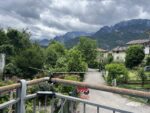
I cannot focus on the meteorological weather as a delivery truck arrives to unload at the supermarket, which carefully crop out of shot. In the moment irritated the moment, but later accept my foolishness of my desire to document the mountains without people, cars and the heavy industry that lines the Fiume Fella river valley.
2024-06-12 20:04:12
Soph Dyer
Dordolla, Italy
Italy
NOAA-15

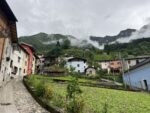
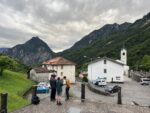
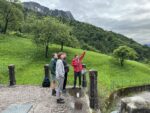
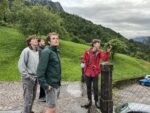
A musician, Pietro, joins us for the satellite pass. The alpine village of Dordolla is so small, we just needed to walk around for word to get to Pietro that we were at the only bar. There is a light drizzle. N makes a beat to the sound of the satellite, tapping the puddle with his foot. Pietro makes a sound recording. He is a drummer. The air is thick with moisture. The energy of yesterday's electrical storm has dissipated, but the clouds have not broken yet.
2024-06-14 21:53:37
Soph Dyer
Tiere Viere, Dordolla, Italy
Italy
NOAA-19

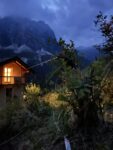
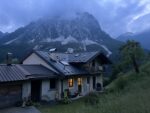
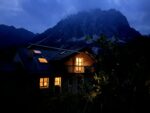
The sky is meeting the mountain. Fair weather, finally. Rain was forecast but did not come. The air smells good. It is a crisp, clear night.
2024-06-16 22:39:42
Soph Dyer
At home, Wien, Austria
Austria
NOAA-18

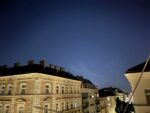
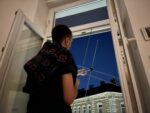
The tat tat tat of toy machine gun drifts up from the otherwise empty street.
It is warm, comfortable.
When we got home from the holiday the tomato plants were stressed from thirst and had curled their leaves from prevent water loss.
After visiting such radically different climates – the dry heat of Istria and the wet cold of Firuli – and after overhearing my sister swap farming anecdotes of a too wet, too cold spring-summer with our host in the agriturismo, I contemplate how local climate is is and the importance of grounding theories of weather knowledge in specific sites.
2024-06-17 12:37:54
Soph Dyer
At home, Wien, Austria
Austria
NOAA-18

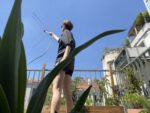
I rush out between Zooms calls to receive this satellite image on the balcony. The weather is warm dry, my mood is light, even joyful. I prop the my phone up on a potted Yuca, so as to get the tomato plants in the frame.
2024-06-18 12:23:59
Soph Dyer
Augarten, Wien, Austria
Austria
NOAA-18
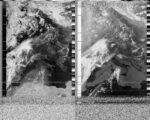
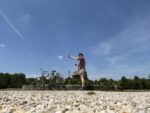
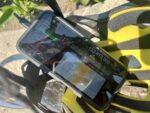
It's heating up. I enjoy how the city radiates heat from all directions, loosening my muscles. I embrace the floppy feeling. Yet Vienna is not yet built for sustained summer heat. Its surfaces are mostly sealed, there is too little vegetation, and it does not cool-off enough at night.
I am standing in the blazing midday with sun cream and sun glasses but no hat. I am still learning how to live in a country that is a little hotter, a little drier than the North of England where I grew up. A group of young school children pass, all wearing matching caps. I take note. Buy a cap. During the satellite pass I try turning on a feature of the software defined radio programme called Automatic Gain Control or AGC for short. Gain is a property of the antenna, which can be manipulated in the software … and this still confuses me. Usually, I use the programme's waterfall display to manually adjust the gain, however today, keen to improve my understanding of gain and the software, I experiment with turning the two AGC functions on and off, and then both on at the same time. The waterfall display turns from blue to yellow to red. To my ears, the signal to noise ratio sounds worse, however the resulting image looks surprisingly uniform. In my studio, M, shares with me a weather forecast from the ORF, Austria's national public broadcaster. She wants me to know that Saharan Dust is forecast for Friday.
2024-07-25 22:53:01
Soph Dyer
Lacknergasse, Wien
Wien
NOAA-18

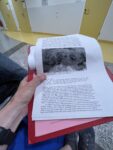
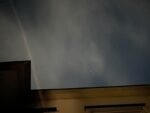
Cool temperature. Still night. There is a thin film of cloud.
Earlier, in the hospital, I read a draft of Wind’s Animacies by Sasha. The article sweeps me up, taking me far from the fluorescent lighting and airless weather of the waiting room. I turn over her question, "what does the wind remember?" I am moved by it, perhaps because I am grappling with how to reorganise my own messy medical history of ill health with the new knowledge that comes with a diagnosis. I once read that remembering can be understood literally as re-memebering, that is putting back together, making whole.
When I think of the last year, I find myself caught between wanting to forget the lost days in bed with a pillow tucked under my abdomen, or the sleepless nights and listless days that followed. Could an earlier diagnosis have changed the course of my access to treatment? This is is both too painful and utterly pointless to think about.
I want the diagnosis to reorganise my memories into a tidy narrative of endometriosis, cysts and fibroids, rather than the current clutter of unexplained, possibly unrelated symptoms that moved around my body to the extent that I stopped trusting myself as reliable narrator.
I sit in hospital corridor, still thinking with Sasha's words: is pain is similar to wind? Neither are immaterial or material. Both pain and wind are energetic, “slippery”, “leaky”?
Thinking about wind’s memory is an analytic move away from asking “where does the wind come from?” (n.d. Engelmmann) A question that forces an artificial cut into time to arrive at a single origin point. I exercise changing the familiar questions “Where does the pain originate?” or “When did the pain begin?" to “What does my body remember?” This new question requires me to relearn to trust it my body and its complaints. To piece it back together.
In a wholly different context, that of the 2016 US presidential election, American essayist and anarchist Rebecca Solnit writes “when the subject is grim, I think of the act of naming as diagnosis.” Diagnosis does not equal a cure, but it is an act of recognition that has the potential to reorganise and make sense of memories.
2024-07-02 21:32:41
Soph Dyer
Sarajevo, Bosnia and Herzegovina
Bosnia and Herzegovina
NOAA-19

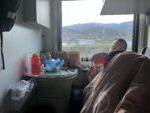
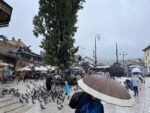
It's been raining. I wait for the weather to clear and capture the satellite's transmission in the dark next to Kovači Cemetery. The low stone wall I am sitting on is cold and damp. The cobbled road near me is empty but at its end, where it opens onto a broader street, people gather at the entrance to a mosque. Uneasy about the location, chosen without knowledge of the city because of it is the closest open space to where we are staying, I attempt blend with the night.
2024-07-09 10:12:00
Soph Dyer
Duboka, Vis, Croatia
Croatia
NOAA-19

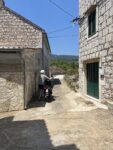
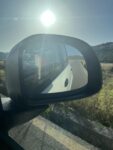
Woke surprised by hot the apartment already was. As I set up my antenna on the track leading into the village, an older man and woman came out of their house to offer me local produce. Sweating, declined in stilted English. Perhaps I sounded Spanish as the conversation turned into an exchange of "Mucho calor!"
2024-07-04 21:05:37
Soph Dyer
Miholjače, Bosnia and Herzegovina
Bosnia and Herzegovina
NOAA-19
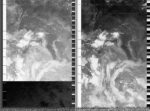
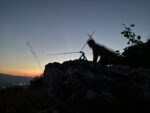
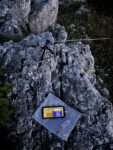
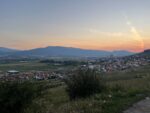
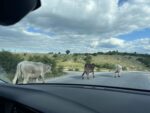
Two fire flies flash. I watch the coal mine and power plant on the plateaux, my radio antenna balanced on a rock above the road. A hazy red sunset bleeds out into darkness. On a walk this afternoon, the owner of the guest house pointed to the where an underground river was being rerouted to accommodate industry. His tone seemed to express a mixture of depression and despair. He did not mention the coal power station, which is not visible from the house. Now I see it, I imagine it thirstily drinking the river.
2024-07-03 21:19:36
Soph Dyer
Sarajevo, Bosnia and Herzegovina
Bosnia and Herzegovina
NOAA-19

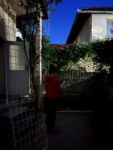
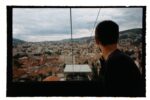
I am stood in the backyard of our host's house. Deep greens and reds of a flowering vine frame the midnight blue sky. Today, N and I visited the Museum of Crimes Against Humanity and Genocide, and then rode a cable car built for the 1984 Winter Olympics to a hilltop overlooking the city. In the evening, we walking along the Miljacka River to the book store 'Buybook Sarajevo' we stumbled on the opening of the BOOKSTAN literature festival. Before we realise that there is a festival, the crowd gathered out side felt familiar. Enjoying the atmosphere, we purchased two white wines and sat on a park bench. As N is at the bar buying a second round, I complement the small dog of an elegant older woman. She tells me that she is a translator of an English language book about the siege written by an author living in the United States. She is here to meet the author, she tells me, and will not stay for the festival as she is already looking forward to returning to her home in the countryside. When I later search for the festival programme online, I find its tagline: “A literary festival where there is neither East nor West, but just humans and their stories”. This evening my memories of working on war crimes investigations in Syria, Iraq and Ukraine, mingle with the stories of survivors from the museum displays. As we were entering the last room of the museum, I thought I could hear a video. There was no video, instead an older woman and man speaking in Bosnian. They looked distressed, I think the woman was crying. The couple were being interviewed by a small film crew. The walls of the yard block my view of the Sarajevo below, yet I know that the city I arrived in three days looks different.
2024-07-10 11:46:31
Soph Dyer
Duboka, Vis, Croatia
Croatia
NOAA-19

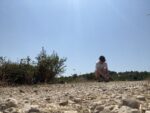
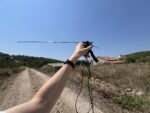
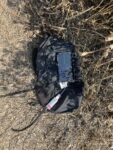
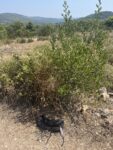
Intense heat stops me thinking. I sweat into my teeshirt and instantly regret exposing myself to the unforgiving sun. "Tomorrow", I note to myself, "wait until nightfall".
2024-07-13 22:42:00
Soph Dyer
Duboka, Vis Island, Croatia
Croatia
NOAA-18
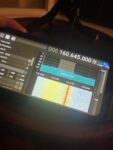
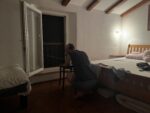
2024-08-29 19:17:00
Prototype Automatic Ground Station 2
Vienna, Austria
Austria
NOAA-15
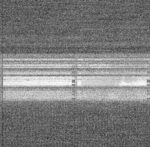
Satellite not known.
2024-08-28 19:30:00
Prototype Automatic Ground Station 2
Vienna, Austria
Austria
NOAA-15
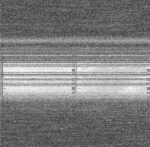
Satellite not known.
2024-08-28 10:46:50
Sasha Engelmann
Hackney Downs, London, United Kingdom
United Kingdom
NOAA-19

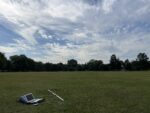
Today the air is still - not so much as a small gust as I orient my Yagi antenna from north to south, tracking NOAA-19. The sky is veiled with light cloud and contrails, and things feel grounded, heavy but not placid. Indeed I feel so unusually calm that I don't leave the house until the satellite pass is actually starting, meaning I am six minutes late to press 'record'. A man is driving around the park with a large tank of water on the back of a truck, watering trees. This feels like such a benevolent and kind thing to do, though I am sure water must be rationed as the trees are turning yellow-brown far too early. As he drives by me, he smiles and gives me a thumbs up from the car window.
2024-08-27 11:52:02
Sasha Engelmann
Hackney Downs, London, United Kingdom
United Kingdom
NOAA-18

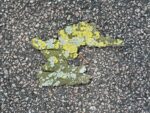
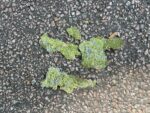
Another windy day, with gusts coming from both the south and west across Hackney Downs. Tree branches and pieces of bark have been peeled off trees and lie on the pavement or grass. Once again my tape measure Yagi was pushed and pulled around by the air, and once again I feared the delicate bits of soldering would come undone. When the dipoles bent down at odd angles, lines of noise permeated the audio recording. I realised today that I had never fully explored the fact that antennas could be malleable- able to move and bend with the wind. We associate antennas with very tall steel towers or elaborate metal sculptures that are nevertheless solid and static- but what about an antenna made of flexible material? I've been aware of 'wearable antennas' via the work of artists like Afroditi Psarra or Audrey Briot, and I have seen experiments in metal weaving, but my tape measure Yagi has raised other questions about working with semi-flexible, yet conductive materials that change rather than holding shape when exposed to air.
2024-08-27 19:42:00
Prototype Automatic Ground Station 2
Vienna, Austria
Austria
NOAA-15
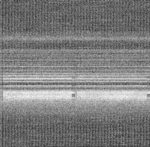
Satellite not known.
2024-08-26 20:50:00
Prototype Automatic Ground Station 2
Vienna, Austria
Austria
NOAA-15
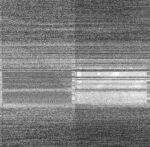
Satellite not known.
2024-08-26 12:02:33
Sasha Engelmann
Hackney Downs, London, United Kingdom
United Kingdom
NOAA-18
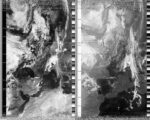
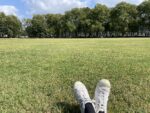

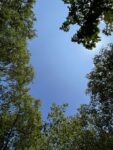
On my way back from the park with my tape measure Yagi, I saw the well-known local character who wears a tracksuit and stands on benches practicing martial arts, every day rain or shine. I smiled and waved hello, and he immediately exclaimed 'there's the aerial!' and for a moment, I think, mis-gendered me, as he called out something like 'oh- a girl!'. He jumped down from his bench and started asking questions- had he seen me before in the park? was I from America? how do I like Hackney? I learned his name is 'Joe' but everyone calls him 'Shaolin Joe' because he practices the Shaolin Arts (martial arts) in public around Hackney and Clapton. I tried to explain why I use my Yagi antenna to capture images from satellites, and he compared my daily satellite passes to the Shaolin Arts... 'meditating with your satellites'. We shook hands and he called out after me 'Have a great day!!' and something like 'good American!'
2024-08-25 18:56:29
Sasha Engelmann
Hackney Downs, London, United Kingdom
United Kingdom
NOAA-15

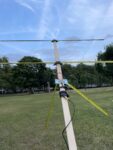
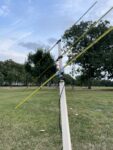
I awoke to a flood of sunlight in the apartment, though the colder air temperatures persisted. My head and body ached and I wondered about residual tiredness or a travel bug. This was all counter-balanced by a morning of indoor plant gardening: trimming the willow tree in the corner of the living room, crafting support structures for newly grown arms of vines near the ceiling, and watering others. When I finally emerged from me and T's apartment to catch an early evening pass in the park, the wind caused the dipoles of my tape measure Yagi to bend and angle all over the place. I tried to find positions where the antenna would slice through the air rather than be buffeted like a kite, but often gusts came from unexpected directions. It was not stormy, but unusually unpleasant, especially with the recent memory of sun-drenched beaches and warmer air.
2024-08-24 19:20:36
Sasha Engelmann
Hackney Downs, London, United Kingdom
United Kingdom
NOAA-15
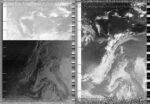
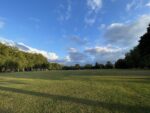
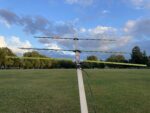
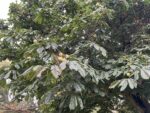
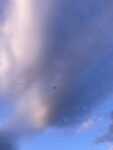
From the heat, humidity and air pollution alerts of northern Italy, T and I travelled back to the UK by airplane in the mid-morning. The previous evening, a thick red and orange layer of particles coated the horizon. It was particularly visible during a long, late afternoon swim to the buoy that marks the limit of the swimming zone at the beach of Lignano Sabbiadoro. Normally, while swimming one can see the coastline of the lagoon and even as far as Trieste, but the haze completely occluded our vision. I read that the air pollution alert would increase in urgency over the rest of the weekend, and wondered whether my asthmatic lungs would react, or whether we were leaving too early on Saturday for my lungs to register. The airplane journey was cloud-free until we reached the agricultural flatlands of Germany, when a few cotton ball clouds appeared. By the time we were crossing the English channel, there were at least three layers of cloud: a thin, staccato layer above the airplane; an intermediary, patchy layer below; and a thicker, grey, monotonous layer close to the ground. We descended through the middle layer but spent another thirty minutes circling above and within the lower layer before landing. As we emerged from the plane, passengers cried out at the cold drizzle and wrapped their bare, tanned shoulders in scarves and other random clothing items - taken by surprise. The rain came and went for the rest of the day. I chose a lucky rain-break to head out to Hackney Downs with my yagi antenna for an evening pass. I noticed yellowed grass; large clumps of maturing chestnuts; and the late-August sunset piercing through the trees to the west, making silhouettes of people gathered around a bench with a sound system. I thought about Soph and urged Soph's cells and molecules to keep binding, smoothing, healing.
2024-08-25 08:37:00
Prototype Automatic Ground Station 2
Vienna, Austria
Austria
NOAA-15
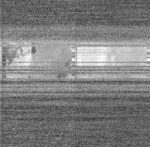
Satellite not known.
2024-08-24 08:49:00
Prototype Automatic Ground Station 2
Vienna, Austria
Austria
NOAA-15
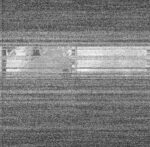
Satellite not known.
2024-08-23 11:04:44
Sasha Engelmann
Belvedere Trabucco in Lignano Sabbiadoro, Italy
Italy
NOAA-19
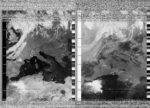
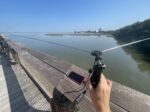
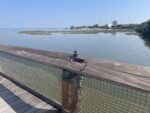
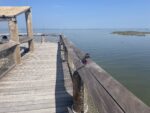
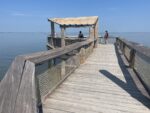
When I arrived at the Belvedere Trabucco - a wooden pier facing the lagoon north of Ligano Sabbiadoro - I discovered it was full of fishing poles. Some older men and a few teenagers were monitoring the poles and their long, taught fishing lines. One young person re-attached the lure on their line - it looked like a spider or dragonfly. Fixing my radio antenna to the edge of the wooden railing, I fished for signals. The sound of NOAA-19 emerged soon after, and gained in strength quickly, as there was almost nothing between me and the Northern horizon except the lagoon and a thin line of land in the distance. In the greenish water below I could see the characteristic clumps of material called 'mucilagine' in Italy. Though mucilagine has been known for hundreds of years and is caused by a non-toxic microalgae, Gonyaulax, it has increased in quantity with rising Adriatic sea temperatures and it poses a growing problem to small fishing boats and businesses. Apparently, some hotels along the Italian coastline are even sending 'mucilagine weather reports' to tourists and travellers who want updated, semi real-time information on the spread of mucilagine in seawater before arriving at the beach.
2024-08-23 09:58:00
Prototype Automatic Ground Station 2
Vienna, Austria
Austria
NOAA-15
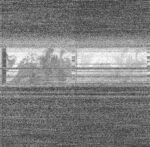
Satellite not known.
2024-08-22 17:29:00
Prototype Automatic Ground Station Wien
Vienna, Austria
Austria
NOAA-15
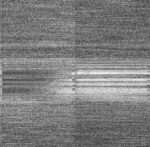
Satellite not known.
2024-08-21 12:28:55
Sasha Engelmann
Quercia delle Checche near Pienza, Italy
Italy
NOAA-18

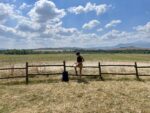
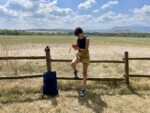
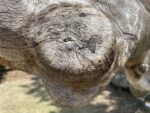
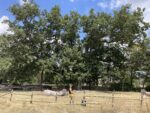
The quercia delle Checche, an approximately 300 year old oak tree and Italy’s first ‘green monument’, is full of dense, perfectly shaped leaves and is apparently thriving despite the dry summer. Planted in the 18th century, the oak was one of the few to survive the rapid landscape changes of the Tuscan countryside as the oak woodland was deforested in favour of agriculture. Rumour has it that Napoleon’s troops stopped to rest in its shade. Numerous local weddings, trysts, rituals and gatherings have occurred under and around its branches. Two large horizontal branches have fallen and now lie like giant bones in the yellow grass. Up close, the dry wood of the branches has whorls and shapes that remind me of Kármán vortex streets caused by wind flowing around islands or mountains. I wonder what events caused the wood to ‘flow’ in this way- what memories does it hold?
2024-08-17 23:02:39
Sasha Engelmann
Jadrolinja Ferry in the Adriatic Sea between Split and Ancona, Croatia
Croatia
NOAA-18
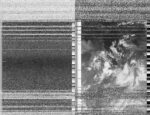
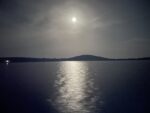
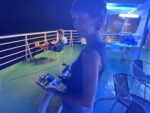
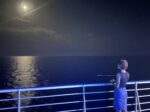
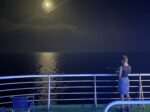
The almost-full moon hung ponderously over the southern horizon of the Adriatic as we made our way slowly across it in an overnight ferry from Split to Ancona (Italy). T and I had hustled on with our car and luggage around 21:30 and by 23:00 we were in the open sea. Languages swum between Croatian, Italian and French as we qued for dinner and wandered around. People had hung hammocks up between stairwells and railings. Others had blown up mattresses on the landings between stairwells, and others were just lying on a thin layer of blanket, exposed to the wind and weather of the sea. As I set up for a 23:01 satellite pass, the air was so humid and sticky- touching the metal railing of the ferry felt like touching liquorice. The darkness of the sea at night felt ominous and limitless.
2024-08-17 18:24:32
Sasha Engelmann
Jadrolinja Ferry between Stari Grad and Split, Croatia
Croatia
NOAA-15
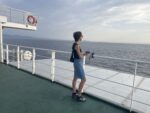
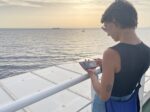
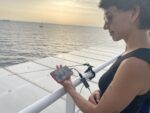
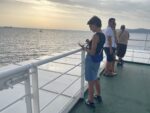
The inside deck of the Jadrolinja ferry from Stari Grad to Split was far too crowded, so me and T sat on the floor of the upper deck. The air rushed around us, but the humidity stuck to our hair and skin. We said goodbye to Hvar for the summer. I said goodbye to my Baba.
2024-08-17 10:39:33
Sasha Engelmann
Zaraće, village of Gdinj, island Hvar, Croatia
Croatia
NOAA-19

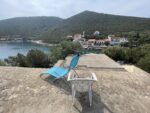
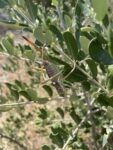
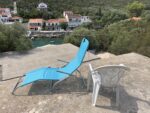
A thin veil hung over the bay this morning, making the sunlight a little bit weaker and more silvery. Me and T had slept in after a hot and sweaty night during which both of us sat up awake at 3am. I squeezed between the bunk beds and tiptoed outside with my radio antenna before any coffee was brewed. As I suspected, leaving out the extension cable meant that I could receive the pass easily and clearly from the rooftop terrace. I hooked the antenna tripod on the edge of a plastic beach chair and held the android phone on my lap, watching the patterns of the mid-morning current in the bay. By the time I was done, I could see the grills starting to smoke to the left and across the water, preparation for a fish lunch.
2024-08-16 18:53:42
Sasha Engelmann
The rocks of Zaraće, village of Gdinj, island Hvar, Croatia
Croatia
NOAA-15
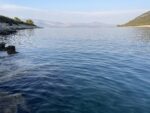
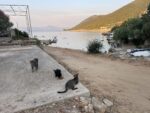
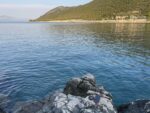
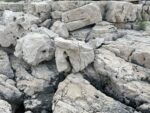
A school of tiny black fish swirled around the rocks, and island swallows swooped and dived for insects above. I sat on a rocky perch at the edge of the sea, under the fisherman’s chapel, where someone had left a bouquet of olive branches, Tradescantia pallida, yellow cow parsley and long grass. A fisherman walked past me on the rocks and I suspected I had taken his usual spot, but he didn’t ask me to move, and he climbed on further, somewhat awkwardly navigating the steep Karst with its jagged edges and slant into the sea. I meditated on the deep time histories of Hvar - how my memories of Zaraće were so bound up with every edge of these rocks, and how far back in time they had emerged from the ocean floor, pushed up by tectonic and geomorphic processes. As I faintly recorded NOAA-15 at only thirty degrees to the east, the tide was coming in, and by the time I packed up, the sea was waking up the limpets and sleeping snails where my feet had been.
2024-08-20 19:28:00
Prototype Automatic Ground Station 2
Vienna, Austria
Austria
NOAA-15
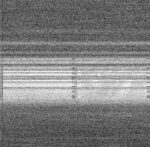
Satellite not known.
2024-08-18 21:56:16
Soph Dyer
Lacknergasse, Wien, Austria
Austria
NOAA-19

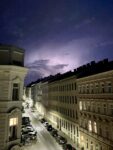
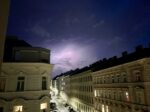
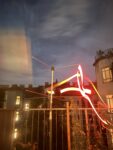
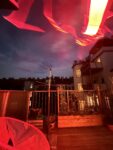
There was a big electrical storm this evening. Bolts of lightening flashed between clouds for hours. As I have spent most of my time indoors over the last two weeks, so to witness this weather event, even from the window, was exhilarating. My recovery from the surgery has been uneven and absolutely nonlinear. I have moments of pure joy, such as when I woke from a nap feeling completely rested, my mind loose but still. But by the afternoon, I miss physical exercise and social contact. I know that I need to ride out this turbulence. Or rather ride with it.
NOTE: I received the satellite image after the storm had passed and the stars were out.
2024-07-18 21:38:15
Soph Dyer
Diepoldplatz, Wien, Austria
Austria
NOAA-19
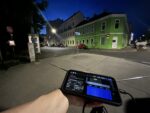
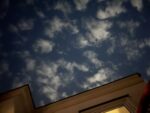
A soupy night. Warm and still. Older men on park benches smoke and watched as I point my antenna. My phone crashes multiple times. I focus on the long beans handing from the tree in front of me. The last kids of the day shouted in the park, two whizz around on scooters with LED lights in their wheels. I try to ignore the men’s gaze and relax into the warmth of the night.
2024-07-17 21:51:08
Soph Dyer
Lacknergasse, Wien, Austria
Austria
NOAA-19
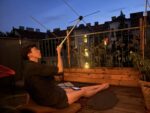
Mottled cloud mellowed the sun and a breeze prevented the air from feeling too close. On the balcony it is dark, grasshoppers sing. The tomatoes are recovering from a lack of water while N and I were on holiday. The crop is about on third ripe. Despite the stress of returning to medical admin and heavy weather between me and N, it’s been a good first day back at work. Sasha and I spoke for more than three hours. The feeling of pressure on my chest is easing. I will make the most of the cool night and sleep early.
2024-08-12 21:29:05
Sasha Engelmann
Zaraće, village of Gdinj, island Hvar, Croatia
Croatia
NOAA-19

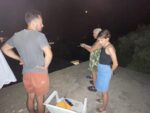
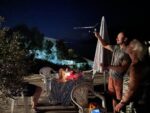
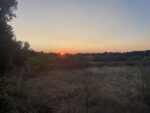
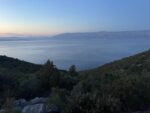
As I set up my ground station on the edge of the concrete terrace at my Mom’s house in Zaraće (a small bay in the village of Gdinj, island Hvar, Croatia) I could feel the concrete emanating heat accumulated over the day. The prior evening a small group of us (friends and family) had ventured out to the warm rocks at night to watch for the Perseids - and we saw several meteors, sometimes so numerous they seemed to speak to each other in the sky. One very powerful meteor passed from 90 degrees above us in a long orange streak to the horizon. Gdinj (and Zaraće) is an origin point for my family - one that stretches back for generations on my mother’s side, through the Čurin family who settled in Gdinj, grew lavendar, cultivated olive trees for oil, and fished in the sea. I remember my Deda (grandfather) waking up at dawn to collect the fish of the day from nets that had been laid out by hand the evening before. It wasn't so long ago that the only way to travel from Gdinj, on the top of the island, to Zaraće at the sea, was by mule or donkey along a narrow dirt path. It wasn't so long ago (only last summer) that I came to Gdinj for my Baba Albina's funeral, an event that drew the whole village, and with people driving from as far away as Belgrade. In the local cemetary, mom and I each read a small passage, and my Mom also read a poem by Vesna Parun. It is always intense for me to be (back) here. I want to forget about the practicalities of life - how to get clean water (the water 'cisterns' aren't always the safest to drink from), how to get food, who to go for ‘kavu’ (coffee) with. I want to just lie without a towel or goggles or rock-shoes on the pale, jagged, karst rocks and stare at the sea. Indeed I have spent so many of my summers doing exactly this, I wonder if my small bones are laced with limestone, seawater, algae, olive, lavender.
2024-07-15 22:12:09
Soph Dyer
Perković Railway Station, Croatia
Croatia
NOAA-19
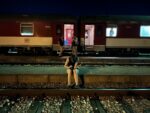
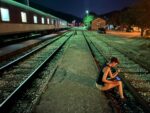
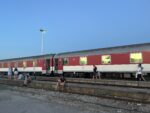
"I wonder if climate change can be measured in hot tracks?" you reply in response to my photo. N and I are waiting with perhaps a hundred other passengers at a small railway station outside Split. The reason, we are told by a cheery Austrian train guard, is that the railway tracks are too hot for the train to proceed. We must wait for them to cool. It is more of a novelty than an inconvenience to be stranded in the warm night with strangers. Assured by the guard that the train will not leave anytime soon, I made a dash to a local store to buy extra water and two ice creams. The small shop is filled with fellow passengers. The atmosphere is convivial if a little restless as we wait for the shop attendant to finish slicing ham for a local customer. I return feeling victorious, carrying the ice creams, the train has not left and will not leave another two hours.
2024-07-14 23:32:15
Soph Dyer
Duboka, Croatia, Croatia
Croatia
NOAA-18

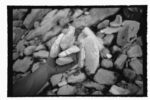
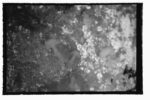
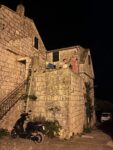
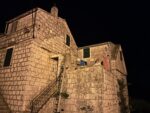
There are even more Mauve Singers in the bay, too many to swim without being vigilant. N and I collect white plastic rubbed smooth by the Mediterranean and bring it back up to the village in bags. Our host is distressed and moved to apologise by the sight of so much plastic. He is an older man possibly no longer unable to make the steep 25 minute hike down to the water. He mentions the heat and then "the Albanians". N is confused and thinks that Albanian tourists have been littering in the bay, as opposed to racialised ocean currents carrying the trash from the Albanian coastline. His misunderstanding lightens my mood.
2024-07-11 22:25:02
Soph Dyer
Duboka, Vis, Croatia
Croatia
NOAA-18
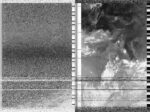
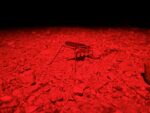
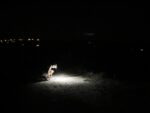
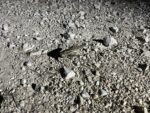
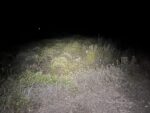
I am getting better at staying cool headed in the heat. Blue skies, a few clouds. A gentle wind brought some relief. Today was hotter than yesterday. Our host said that he installed the air conditioning unit the day we arrived. He complained many times about the heat. It was a reassuring to know, as a Northener, that I was not the only on struggling. Yet it was disconcerting to know that the heat was new. It has not always been this way. N and I waited until the relative cool of the night to receive a satellite pass. We walked down to a track leading away from the village. Using a head torch, I checked for snakes. To my relief, I found a grass hopper laying eggs and a stray cat. Towards the end of the pass, curious to know what other animals might be near, I looked around for more eyeshine. My survey revealed many small green dots. I approached, expecting to find small animals, perhaps lizards warming themselves on the stone? Instead, behind each green dot was a Radiated Wolf Spider. N and I were being watched by tens of spiders. I dislike spiders so quickly packed-up and retreated to the house, eyeing the green dots lining the track.
2024-08-19 20:38:00
Prototype Automatic Ground Station 2
Vienna, Austria
Austria
NOAA-15
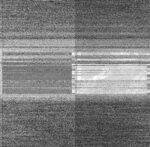
Satellite not known.
2024-08-18 20:50:00
Prototype Automatic Ground Station 2
Vienna, Austria
Austria
NOAA-15
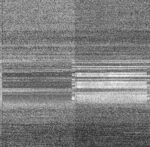
Satellite not known.
2024-08-17 06:35:00
Prototype Automatic Ground Station 2
Vienna, Austria
Austria
NOAA-15
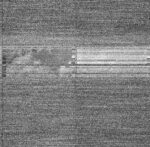
Satellite not known.
2024-08-16 08:48:00
Prototype Automatic Ground Station 2
Vienna, Austria
Austria
NOAA-15
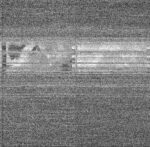
Satellite not known.
2024-08-14 17:35:00
Prototype Automatic Ground Station 2
Vienna, Austria
Austria
NOAA-15
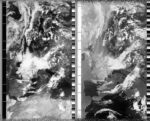
Satellite not known.
2024-08-14 10:11:00
Prototype Automatic Ground Station 2
Vienna, Austria
Austria
NOAA-15
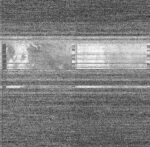
Satellite not known.
2024-08-13 06:38:00
Prototype Automatic Ground Station 2
Vienna, Austria
Austria
NOAA-15
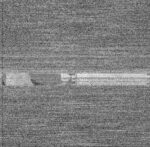
Satellite not known.
2024-08-12 19:27:00
Prototype Automatic Ground Station 2
Vienna, Austria
Austria
NOAA-15
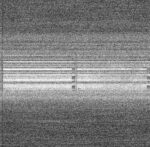
Satellite not known.
2024-08-11 19:39:00
Prototype Automatic Ground Station 2
Vienna, Austria
Austria
NOAA-15
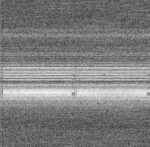
Satellite not known.
2024-08-10 20:50:00
Prototype Automatic Ground Station 2
Vienna, Austria
Austria
NOAA-15
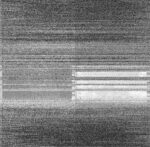
Satellite not known.
2024-06-07 13:41:29
Sasha Engelmann
Hackney Downs, London,
NOAA-18
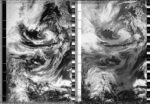
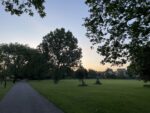
The sun was rising when I rode my bike through Hackney Downs this morning, coming back home from a club in Dalston. My limbs felt both heavy and light in the very pleasing way that limbs feel when you have been dancing for hours. People were already in the park, or maybe they had been there the whole night. I could see the faint spark of a cigarette in a huddle of bodies between the hedges. I thought about getting my radio antenna and catching a pass at dawn, but sleep was too tempting. Later, at almost 2pm, I re-emerged from my flat and went back to the park. In contrast to the soft, orange-pink glow of the early morning, the early afternoon was warm, hot and dry. As I started the pass, a man in a group of men that normally always stand around a bench at the north-east corner of the park, around thirty-forty metres away from me, yelled "Is that for free internet?!". I could only think to yell back, "No!". As I couldn't explain at such distance, I used my free arm to point to the northern horizon and traced an arc through the sky from North to South. That seemed to help. He yelled again "What are you tracking!!?" and I replied "A satellite!! An image!!". As no members of the group looked like they were going to come any nearer, I walked over to them after the pass was done, and showed them the live-decoded image. They huddled around my computer. I wondered what they might say about the weather, given that the five to six of them are always here at this bench, all day, every day, rain or shine. Instead, they asked me what the weather was going to be like. I said I was not a meteorologist, but the image was showing different patterns of clouds over the Atlantic, maybe coming to the UK. They seemed to like this. One of them said 'nice one mate' and shook my hand in the way men do when they put out their arms, bent at the elbow, with the hand close to the chest. When you close hands you end up getting pulled together in a show of comraderie.
2024-06-06 12:11:30
Sasha Engelmann
Hackney Downs, London, United Kingdom
United Kingdom
NOAA-18
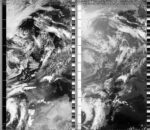
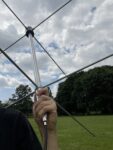
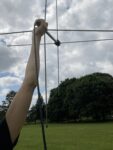
Over these last couple weeks, I sometimes observe the darkness of the landforms in the satellite images, especially in the Infrared Channel, usually on the right side. Though I have not studied infrared radiation scientifically, I know that, in the Infrared channel, the darker the pixels suggest that something is 'warmer' while the lighter pixels suggest 'cooler'. In today's image, even the northernmost part of Norway appears to be relatively dark, emanating and radiating heat against the neutral gray of the Barents Sea. The coastline and interior of the African continent also stands out in the InfraRed channel. Yesterday, a colleague who works in Cambodia studying the lives and labour of brick kiln workers told me about how the workers measure time and seasons by how fast it takes a large ball of clay to dry outside. In some seasons it takes five days, while in other seasons it only takes five hours. Their work rhythms are intimately related to the drying of the clay, and so also the heat and movement of air. In a meeting this morning I was reminded of Michael Taussig's writing on heat. He says, "Heat is a force like color, that sets aside the understanding in place of something less conscious and more overflowing, radiance instead of line, immanence instead of the famous bird's eye view" (Taussig, 2004: 31). As I pored over the 'satellite-eye's view' of today, I wondered about where heat as a 'force' shows up. Does it only show up in the clay ball that tells about heat by how fast it dries? Or does the force somehow also 'show up' in the satellite image, in the darkness and contrast of pixels? Thinking of the ball of clay makes me feel more connected to the idea of heat as 'force', but I keep wondering whether there are ways to use colour ('something less conscious and more overflowing') to demonstrate or express more of heat in the satellite image. In contrast to 'heat maps' where red and dark purple often signify the intensity of heat, how else could colour map heat, how else might it suggest 'immanence' or 'radiance' instead of line?
2024-06-04 09:27:43
Sasha Engelmann
Grassy Field near the Physics Department, Royal Holloway University of London, United Kingdom
United Kingdom
NOAA-15
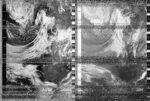
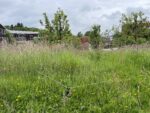
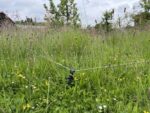
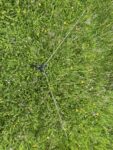
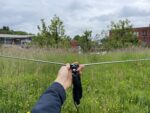
Today has been about rhythms. I organised and choreographed so many rhythms for myself and others, but the most intense was chairing a meeting with Soph and two Croatian scientists with whom I have been in email contact for months, and whose work I have studied extensively in order to include in a recent article on 'wind's animacies' and dust over the Mediterranean and Adriatic Sea. After so many protracted email exchanges and engaging slowly and carefully with their scientific work these last months, meeting them online was an experience of personality-encounter, joy, Croatian-language exchanges and rapid firing of questions (though I didn't manage to ask all the questions on my list). Later, during a research group seminar on ‘research rhythms’, we read aloud and discussed fragments of writing that suggested different rhythms, whether poetic, scholarly, scalar, material, or musical. The notion of ‘rhythming’ in research and a general tuning to the ‘science of the word’ is examined in an essay called "Rhythm, or On Sylvia Wynter's Science of the Word" by Katherine McKittrick, Frances H. O'Shaughnessy and Kendall Witaszek (2018). Starting from the work of poet and philosopher Aime Césaire, the authors write: “Césaire’s observation—that a creative science reckons with how poetic knowledge “is born in the great silence of scientific knowledge”—calls on the harmonious structures of collaborative thought in order to reconceptualize what it means to be human”. In other words, a 'creative science' suggests that there are ways to speak and enunciate research (including science) that are more truly collaborative and so rhythmic. I was immediately reminded of the interdisciplinary collaboration of the Croatian scientists and their willingness to be in dialogue with me and Soph on the call. McKittrick et al (2018) continue: “Like Césaire, Wynter does not turn away from scientific knowledge and privilege poetic knowledge, but rather shows that science of the word is an articulation of science and poetics together. This provides a “fulfilling knowledge,” one that understands the human in its most actualized form through the “climate of emotion and imagination.”” I love the idea of ‘science of the word’, that through a sensitivity to the craft of writing and ‘making’ words we are enacting a science that can perhaps see through the ‘silences’ of normative Science, which as the authors outline, has been responsible for articulating a version of nature that makes it possible to imagine and enact culture as separate to nature. We can ‘think science and poetics together’ in ‘fulfilling’, actualised and emotional ways. This is where I hope the collaboration and conversation with the scientists is going, though I know it is unfair to presume or predict outcomes. In the mean time, I want to return to their articles with an attention for 'science of the word' and 'narrative devices'.
2024-06-03 12:49:14
Sasha Engelmann
Hackney Downs, London, United Kingdom
United Kingdom
NOAA-18
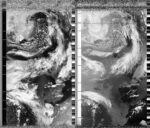
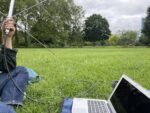
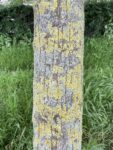
This Monday was full of grey light and low hanging cloud, and after a morning of open-weather meetings, I found myself sitting in the middle of Hackney Downs, happy to be listening to the sound of a satellite but craving some colour. On my way back from the park, a bright burst of lichen caught my eye. I identified the species (or 'collaboration' between species) as within the family of Teloschistaceae which really refers to a large group of mostly lichen-forming fungi that have a 'cosmopolitan distribution' (meaning that they can be found in most places around the world, much like the pigeon and the orca). Most members of Teloschistaceae are lichens that either live on rock or on bark, but about 40 species are 'lichenicolous' – meaning they are non-lichenised fungi that live on other lichens. Apparently, in Spain, a member of this family of lichen-forming fungi has been included in wine-based decoctions for menstrual issues, and infused in water as a remedy for kidney and tooth ailments. Later in the day, I bought raspberries and blueberries entirely because of how they glowed bright-red and blue-purple in the fruit section of the local market.
2024-08-08 23:17:13
Sasha Engelmann
Lignano Sabbiadoro , Italy
Italy
NOAA-18

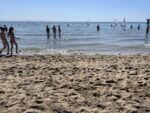
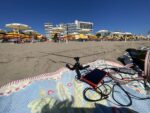
Acqua! ventisei. Sabbia! trentasette. (Water! twenty six. Sand! thirty seven). A voice called out the temperature of sea and land on a loudspeaker at the beach of Lignano Sabbiadoro on the Italian coast. I placed my towel on the sand next to a lifeguard station and felt the heat. People were running from their umbrellas to the sea (sometimes carrying small children) as the sand burned underfoot. I debated trying a satellite pass, decided not to in this unlikely location, and finally thought I’d try. Something about being in a swimsuit with the ground station immediately felt weird! My radio antenna got the attention of many, even at a distance - I caught several men with beer-bellies and leathery skin staring at me. Sadly I didn’t catch any signal - I had a big view of the sky, and checked and re-checked my settings, but it was difficult to see the tiny numbers in the android radio software in the sunlight. I decided to try again later, and I ended up catching a pass late at night from the balcony of T’s mom’s apartment. The shadowy form of the boot of Italy appeared in the infrared channel, lighter than the water (and therefore cooler). This puzzled me until I realised that land loses heat faster than water; the sea ‘holds’ it.
2024-08-09 21:03:00
Prototype Automatic Ground Station 2
Vienna, Austria
Austria
NOAA-15
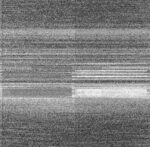
Today, I came home from the hospital. The weather was fair and I wore a tee white printed shirt and black slacks, loose at the waist. Satellite not known.
2024-08-06 19:00:00
Prototype Automatic Ground Station 2
Vienna, Austria
Austria
NOAA-19
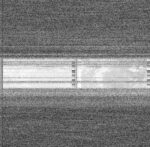
There was no satellite recording today because N was still troubleshooting the prototype ground station, so a bending of time, this recording is from tomorrow, the day of my operation. As I write this, I am waiting for the 'big day'. It’s raining, I can hear but not see the water cascade onto the hard facade the 1970s hospital building as the long curtains in my room are closed. Possibly for privacy or, I speculate, because the my roommate left for the operating theatre this morning when it was still dark. Either way the yellow glow of the artificial lights makes me groggy before anyone has even laid a finger on my body. A nurse searches for the word in English, “I will tie the bandage tight so as to stop a …. hema-toma." "Your vein opened too wide," she explains. "God", I say, "that sounds bad!" She reassures me, then sticks a cannula above my wrist where there seems too little flesh between skin and bone to cushion its intrusion. It stings. I watch my blood back flow into the two plastic tiny tubes. “I think that I’m going to throw up,” I say as a nurse announces lunch. I am given a cardboard bowl to throw up in and a tray with a clear soup, asparagus, rice, lettuce leaves, and a yogurt. I skip the yogurt and throwing up, and decide that I need sunlight. Opening the long curtains brings into view a drab but solid looking Altbau opposite. The rest of the day passes with time suspended between boredom, anxiety and grief, the sources of which I guess but chose not to give shape to with words.
Satellite not known.
2024-06-02 13:03:32
Sasha Engelmann
Hackney Downs, London, United Kingdom
United Kingdom
NOAA-18

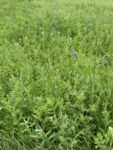
My arms and legs are scraped from nettles and bracken after an afternoon at Richmond Park, but I feel so happy to have these reminders of a day among the oaks, elms and white-tailed deer. After I captured a hurried satellite image from the middle of Hackney Downs, my partner and I took a long overground train from Dalson Kingsland to Richmond station, and once in the park, we followed several trails away from the central lake and 'acid grassland' where most people congregate. The park was golden and shimmering in sunlight, and the greenness of everything was 'overwhelming' as my partner put it. Lying on a log in the sun, I opened my eyes to see a hawk making circles overhead, barefly moving a wing-feather. I heard a sound like a sneeze, and looked to the right, spotting a doe with two fawns. Lime green parrots talked excitedly in the branches and zipped from gnarly twig to tree trunk. A spider with a large bulbous abdomen scrambled over my leg.
2024-06-01 11:34:03
Sasha Engelmann
Hackney Downs, London, United Kingdom
United Kingdom
NOAA-18

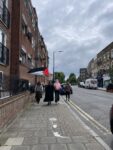
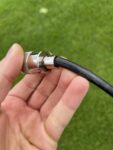
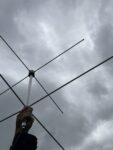
As I begin the satellite pass, a young group of friends pass by, and one asks whether I am responsible for the pile of soccer balls a few metres away. This is a little funny, as there is an active young boy's soccer game on the field where we are standing, and I doubt I look much like a soccer player with my radio antenna. A young woman in the group yells to ask what I am doing, and after my one-sentence answer, they turn away and proceed to set up their picnic toward the south edge of the field. As I am packing up ten minutes later, though, the woman runs over and asks to see the image. She is joined by another friend. As I show them the enhancements of the image data, she remarks on the jagged coastline of the northern part of Norway, and the western edge of Scotland, wondering aloud whether the coasts are so complex because they receive the wind of the North Atlantic, whereas the east coasts are 'smoother' because they are more sheltered. As she speaks I admire her sparkly turqoise eyeliner and try not to stare. They are especially impressed by the colour infrared image of the highest cloud tops. They joke about how many times I must have explained this to other people in the park, and it's true, I say, I've met more people in the neighbourhood by waving an antenna at the sky than I might have by going to town hall. Half an hour later, I actually do join a Palestine march to Hackney Town Hall, following the echoes of protest chants through grey skies and an unusually cold wind.
2024-05-31 10:32:35
Sasha Engelmann
Burgess Park, London, United Kingdom
United Kingdom
NOAA-19

Today I am striking in solidarity with Palestine together with other UK-based practitioners and organisations. The strike is organised by Mosaic Rooms and Migrants in Culture, specifically calling for groups and individuals engaged in cultural work to withold labour today, May 31st. My academic work as a cultural geographer is part of the cultural milieu in the UK, as I publish open access articles related to artworks, artistic collaborations and networks. Though open-weather is a fragmentary, precariously funded cultural project, it does participate in the cultural sphere. In lieu of a long-winded 'weather note' or working on a new academic article, I am spending the day doing the following:
- Building an open access resource library on Palestine Geographies
- Emailing my union on moving forward a public statement on Palestine
- Engaging with and applying resources on university action by University and College Workers for Palestine
2024-05-30 12:03:48
Sasha Engelmann
East Park, Southampton, United Kingdom
United Kingdom
NOAA-18
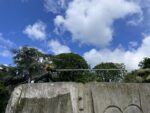
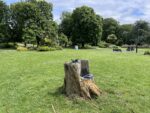
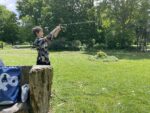
Wind is the subject of a half-day symposium at John Hansard Gallery in Southampton where I am presenting on behalf of open-weather. I am looking forward to the constellation of academics, scholar-artists, and members of the public who are going to share new work and join the conversation. A scientist called Richard Cornes from the National Oceanography Centre talks about histories of weather observation gleaned from the diaries of French and English scientists who kept careful records of temperature and pressure. An artist named Abelardo Gil-Fournier who has just co-written a book with Jussi Parrika presents his sculptures and experiments in the cinematography of wind. Scholars Maximilian Hepach and Bergit Schneider examine the diaries of John Muir, the drawings of Da Vinci and the paintings of Van Gogh to 'read one elemental media ecology against another', for example reading air through a description of ice in Muir's semi-spiritual field notes. JR Carpenter and Jules Rawlinson perform a sonic, poetry and visual piece called An Island of Sound featuring fossils, nautical charts, wind roses, walruses and other characters. We all stay out late at a local pub chatting and catching up, and I am filled with the nourishment of ideas, new reading recommendations, academic gossip, the sharing of intellectual projects and agendas, and generally feeling like we are all participating in an intellectual project around air, weather and wind. As I am rarely in a room with so many fellow air and wind scholars there is something momentous about this, and I am reminded of the ways that scholars used to travel for days, over hundreds of miles on land, to attend conferences together, to feel like they were taking part in a common project. I am by no means naive to the eliteness and exclusivity of this history, but I remind myself that it is also OK for today to be about the joy of shared and generous participation in overlapping academic work.
2024-05-29 12:11:41
Sasha Engelmann
Hackney Downs, London, United Kingdom
United Kingdom
NOAA-18
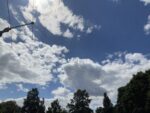
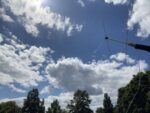
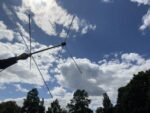
I have been thinking a lot about how scholars, artists and others investigating air try to 'substantiate' it in their work. In a chapter on 'Air's substantiations', anthropologist Tim Choy makes an analogy between a scholar/artist/practitioner studying air, and a PM sensor on the roof of a building. He writes, "enclosed machines on rooftops and streets ingest millions of mouthfuls of wind a day, calming it so that the particles it holds can be collected to count, to accumulate enough of the particular for it to register as weight, as substance worth talking about" (2011: 146). Choy continues, "miming this method, I collect the details in a diffuse set of contexts" to "turn the diffuse into something substantive" (2011: 146). This comes after a discussion of the ways in which air invites us to trouble binaries of the particular and the universal in cultural theory, both of which end up reifying solidity and 'ground'. 'Miming' the PM sensor, though, aren't we, as scholars and other practitioners, largely falling into the trap of 'particularising' air, counting particles so that our analyses add up to something worthy of empirical and conceptual attention? As I read across social science and humanities writing on air, I notice how often the 'particle' comes up, even when people are exploring the meso-scales of topics like breath and policy brutality. Is there something also about the outpouring of scholarly and artistic work on the citizen science of air quality that makes us feel we can and should be counting particles, even when that's not what we are doing? What if, in efforts to 'substantiate' air, we paid more attention to the fullness of air's aesthetics, its movements, gradients, vacuums, and porosities... the emptiness in between loosely tethered molecules? Rather than 'mouthfuls' of particles we might be substantiating something closer to texture, impressions, traces.
2024-06-10 12:25:53
Ray Dyer and Soph Dyer
Mošćenička Draga, Croatia
Croatia
NOAA-18
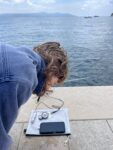
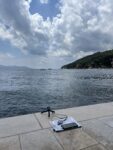
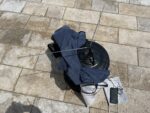
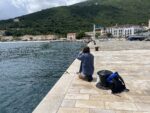
I am on holiday with my sister, Ray, and her partner Ben. When we check into our Airbnb the host, a women a little younger than our mother, apologies for our "bad luck" with the wet weather. We engage in pleasantries about how unpredictable the summer has been, and wet and warm the spring was. "We are not looking after Mother Earth", our host concludes. Her tone is serious. I think I detect fear, but cannot be sure. We say that "we do not mind", that "we will swim anyway", because "we are from the North".
2024-08-03 22:39:31
Soph Dyer
Lacknergasse, Wien, Austria
Austria
NOAA-18
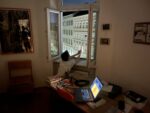
Still, mild, mottled clouds. Clear air. By contrast, there is so much to write about the turbulent, changeable weather of last week. And, yet, I know some weather is ineffable or Unwetter. Together, Sasha, we altered each other. My hormones were so low (by chance) and I was grieving how my body will be changed by the coming operation. You tried to lower the waves of adrenaline and cortisol with empathy, touch and grounding words. It worked, to a point. We were what M Murphy, co-director of the Environmental Data Justice Lab, calls "endocrine participating" (Murphy 2024). Yet the estrogen and progesterone in my body refused to join in, staying stubbornly low, disturbing my sleep, making my recall foggy. You felt so steady and strong, but I know that you too were tired and running on empty. Our boundaries, dangerously porous. Yet, in clear breach of feminist protocol, we worked. We worked on this project: carefully dismantling and debugging 3D-printed prototypes, testing digital interfaces, and making logistical plans for when and how to send hardware to far away locations. We swam and drank too many Weißer Spritzers. You tried to order a doppelter Espresso but instead made-up the word "dooblé". We laughed, mixing caffeine with dopamine, oxytocin and endorphins. We laughed too when, during a beautifully intense dance performance, we saw ourselves in the two dancers' energetic, full-bodied exchange. On the way back from lunch, I quite literally fell over your feet, bloodied my knees, and sat wordlessly gulping for air on the pavement. The activities list I drew-up before your arrival is now half crossed-out. Hungry to share, you and I pushed each other, as always. Next time, I hope for fairer weather between us.
2024-08-02 22:55:42
Sasha Engelmann
Kottbusser damm, Berlin , Germany
Germany
NOAA-18
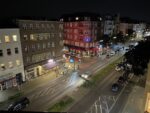
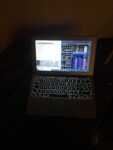
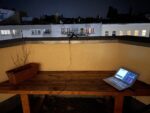
Berlin, Friday night, August. I peeked off the ledge of my friend Omid's fourth floor apartment on the Kottbusser damm, and set up my ground station looking East. The traffic 'rush' sounds below mingled with laughs, drunken conversation and sometimes yells or screams. I noticed how the antenna reacted to the side of the building, the almost-midnight radio environment, and to being hand-held - it preferred the balcony ledge. I had travelled all day by train from Vienna after an intense week of work with Soph, a week in which we ate market-fresh pickles, swam in the Danube, worked like crazy on open-weather, and sat together with pangs of uncertainty about the future, both immediate and further afield. From my midnight perch, I sent Soph a hug and some calm energies through the body-temperature air.
2024-07-26 19:58:20
Marlene Wagner and Soph Dyer
Seestadt, Wien, Austria
Austria
NOAA-19

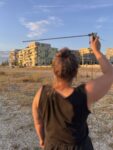
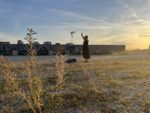
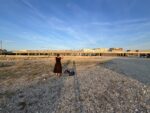
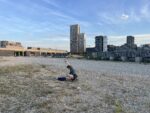
Warm wind, residual heat. U-Bahn, aeroplanes, kids on the beach, gravel under our feet. Long shadows where the city meets the landscape.
2024-07-26 10:48:57
Sasha Engelmann
Hackney Downs, London, United Kingdom
United Kingdom
NOAA-19
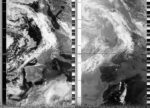
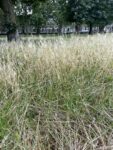
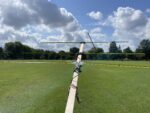
After another colder, misty and rainy day yesterday, and intermittent dark and gloomy clouds this week, it is a relief once again to feel some sun. The air is relatively calm, and a high altitude cirrus or haze makes the light a bit silvery. The ground is still moist in places, though elsewhere the grass has dried and turned a light beige. As I walked down the steps of my and T's house, a man on a bike, whose name I later learned is Duane, did a double take, then stopped and said he had seen me many times in Hackney Downs, and wanted to know about my Yagi antenna. We chatted briefly and, though he had to go toward Clapton, he said the next time he saw me in the Downs, he would come over and see what I was doing. We shook hands twice before parting. As I was leaving the Downs after the pass about twenty minutes later, an older man called out to me. He said he lived close to Hackney Downs and had seen me many times with the antenna, and now wanted an explanation. I showed the satellite image I had just live-decoded and he mentioned his own work as an artist. As his hands were trembling, he asked me to type in the open-weather website to the Notes on his phone.
2024-07-24 10:38:20
Soph Dyer
Danube Canal, Wien, Austria
Austria
NOAA-19
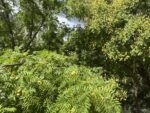
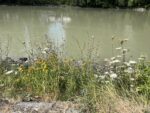
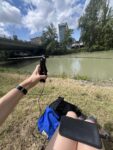
The sun went in and out flooding the lush foliage in a dramatic yellow light. I had run out of time to reach the park, so carried my bike down a flight of steps to the bank of the Danube Canal. To my right two, trees that I did not recognise bore seeds and globe shaped fruit. The uncut grass next to the water's edge was flush with wild flowers. Up stream, almost under a road bridge, a woman wearing a hippy paisley print vest was collecting something from the bank, slowly filling two plastic shopping bags. I assembled the antenna unhurried with the knowledge that in my sunken position the satellite would take need to be almost overhead before I could receive it. It's transmission arrived earlier than I expected but my phone crashed, corrupting the file and forcing me to restart the recording. Once done, I sat on the bank, listening to the satellite's rhythmic presence and enjoying the cool winds and waters of the Danube.
2024-07-22 19:33:19
Soph Dyer
Park bench, Lackerngasse, Wien, Austria
Austria
NOAA-15

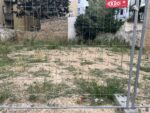
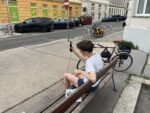
What I thought was the beeping of a heart monitor was actually the beeps of a pedestrian crossing. I feel hollowed out. Heavy and exhausted, I sit on the street corner bench. I began the satellite pass stood next to the empty plot beside our house but moved because there was so much radio noise. It has become a mysterious fact that, since the block of flats that stood there was demolished last summer, the void has been filled with radio waves. I imagine live electrical cables buried under the compressed rubbled. Electric snakes hidden under shattered brick. This image has stopped me from venturing behind the flimsy construction site fence to pick wild flowers. A woman walking to beautifully glossy dogs stops to ask if I am listening for bats. For a moment, I wish that I was engaged in a short-range, in-situ sensing that could connect me more directly to the nature that surrounds me. Before the building was demolished there was a large bat population. No, I say, weather satellites. Man-made, metal birds, a thousand kilometres away. One of the three sisters in my building passes and asks what I am doing. I offer a less than satisfactory explanation as I have decided to rush to the nearby supermarket before it closes to buy a 'sports drink' in an attempt to replenish the electrolytes in my body.
2024-07-23 12:28:13
Sasha Engelmann
Tide Square, North Greenwich , United Kingdom
United Kingdom
NOAA-18

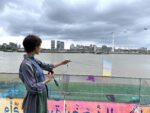
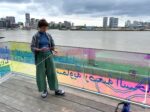
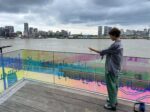
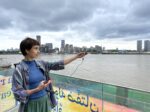
We woke up to dark skies again, but the air remained warm, humid. On my way to Southwark Bridge for a morning appointment it began to drizzle-rain and city-workers clutched their goose-bumped arms. Hours later I unfurled my antenna on the 'Tide River Walk' in North Greenwich, and almost immediately began to hear and receive an air traffic control downlink on a frequency overlapping with that of NOAA-18. A young man agreed to take some photos, and then went back to leaning on the railing, meditating on the water. Charli XCX's 'Brat' bounces through my headphones for most of the afternoon as I ride the overground and express mail some open-weather kit to Berlin. "When you're in the party b-b-bumpin' that beat / 666 with a princess streak..."
2024-07-22 11:37:21
Sasha Engelmann
Hackney Downs, London, United Kingdom
United Kingdom
NOAA-19

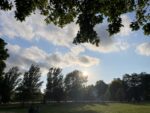
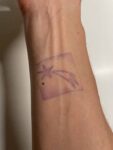
It is very windy today - the kind of surprising wind that gusts and blows in corridors. It was a struggle with my Yagi antenna, as it catches the air so easily, and at several points almost took me sideways with it. The tape measure joints swung at odd angles from the wood stick. An older woman and a small, white, curly haired dog were meandering nearby and I waved to say hi. We ended up speaking for most of the satellite pass. After considering my antenna for a few minutes she said: "the satisfaction... it gives satisfaction" and then "it's contact". I completely agreed.
2024-07-21 18:59:29
Sasha Engelmann
Hackney Downs, London, United Kingdom
United Kingdom
NOAA-15
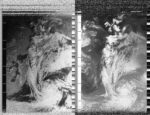

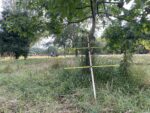
I wake up having had a nightmare, but it is really a memory of a real event that was playing out in my dreams. In the memory, I am seeing one of my PhD students get publicly attacked by a senior professor (who is also someone I respect and in some ways depend on). I run through all the ways I could have acted differently in that moment. I visualise myself standing up in front of the room and hitting back. It plays and plays, until I manage to have breakfast. By lunchtime, though, I am lost in the flow of an article I'm trying to finish before holiday. As a visual contribution to the article, after lunch I experiment with making a satellite image (one that features a current of 'Saharan Dust' moving northward over the Mediterranean) into a 'thaumatrope': an analog, double sided, spinning device that creates an optical 'illusion' of blurred borders, animated shadows, and miscible surfaces. It feels good playing with a satellite image not on a digital screen (as I overwhelmingly do in open-weather) and rather in tactile, DIY form, using a tool that is reminiscent of children's games. For me, the thaumatrope creates a kind of optical 'irritation' of moving forms, nebulous shapes and shadows, and disappearing or fading-out land and sea edges. It also seems to 'agitate' the cartographic orientation devices that we use when we see the coastline of North Africa and the 'boot' of Italy. Writing of images of the monsoon, Harshavardhan Bhat writes, "Satellite images empowered by spectroradiometer science and international coalitions begin to not just inform the science of the state but the imaginary that the monsoon unifies the entity called South Asia as part of a planetary system... This is a gift to political theory as the monsoon then becomes this technology through which the planetary infrastructure of surveillance and governance slowly unfold, silencing the complex work of the air of the monsoon" (2022: 240). Does the thaumatrope help to destabilise the 'unified entity' of the Scirocco or Jugo wind that brings 'Saharan Dust' to Europe? Does seeing a satellite image flicker and blur between channels demonstrate something about the 'slippages' of materials and elements in satellite imagery, inviting us to see beyond the 'optical ontology of pixels'? In contrast to a regional 'event', can we recognise something about the 'complex work of the air'?
2024-07-20 21:11:38
Soph Dyer
Postsportverein, Wien, Austria
Austria
NOAA-19
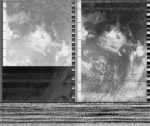
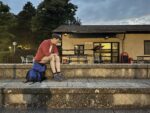
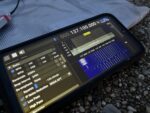
A welcome overcast day with light rain. Inexplicably, I heard air traffic control on the same frequency as the satellite NOAA-19. I was sitting on the concrete bleachers of the local sports ground, beneath a GSM mast for mobile (cellular) phones, but I cannot think think that could have had an effect. The transmission seemed too strong to be a harmonic. Decreasing the bandwidth to exclude the noise worked well. I feel lethargic.
2024-07-19 11:37:22
Sasha Engelmann
Hackney Downs, London, United Kingdom
United Kingdom
NOAA-18
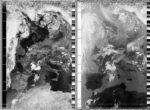
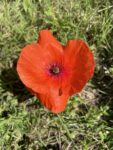
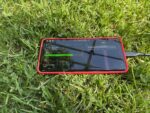
It was too hot to be in the sun so I perched on the edge of a pool of shade made by a plane tree. A man in a track suit who is a kind of local figure in the neighbourhood - often seen balancing on post boxes, tall gates and bus benches doing dance moves that resemble Tai Chi, always in a full track suit - walked by, waved and said 'So I expect you're listening to the Gods??' 'Yes sort of!' I replied, hoping he would understand I was joking. 'Nice one!' he replied, and then followed with "I like your glasses!!!'. 'Thanks!' I said, and remembered how I had gotten my sunglasses at the 'Accessorize' shop in Kings Cross station while waiting for a train a few summers ago. Another man in a neat vest, jeans and glasses approached me a few minutes later and quietly asked what I was tracking. After I replied, he exclaimed 'And I thought I had an interesting job!!' 'What's your job?' I asked. He said 'Oh I park cars... BMWs... train driver too'. He went on his way.
2024-07-19 12:35:34
Soph Dyer
Augarten, Austria
Austria
NOAA-18
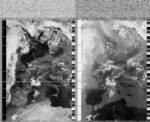
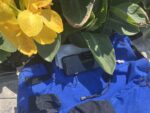
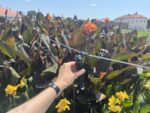
Blue sky, hot. The city is heating up again. Yet the park, usually busy on such days, is quiet. Presumably many residents are already on holiday. Summer holidays are taken seriously in Vienna. Its shops and restaurants can shut completely, sometimes for more than a month, only reopening in September. This ritual of city life and work grinding to a halt in high summer as people take in long holidays, is a side of Austrian culture that is, perhaps, less well know and more associated with our hotter neighbour, Italy. I hide the ground station's hardware under the shade of a plant, and limit my time in the sun by leaving as soon as the satellite pass is over. I am tried and a little nauseous today, but in the openness of the park these feelings are less.
2024-07-18 11:51:41
Sasha Engelmann
Hackney Downs, London, United Kingdom
United Kingdom
NOAA-18
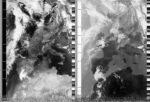
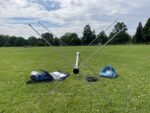
I've spent all day writing, and my thoughts are swirling around ideas of memory, wind, history, and the way wind makes 'traces' and 'marks' in satellite imagery. The article I'm editing feels to have its own weather too, one of 'rabid gales', blue vanishings, wind-blown dust, 'pigments and mist' and vast differentials in temperature and pressure, pulling air into all sorts of space and corners.
2024-07-17 10:58:28
Sasha Engelmann
Founder's Field, Royal Holloway University of London, United Kingdom
United Kingdom
NOAA-19
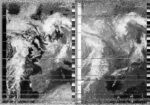
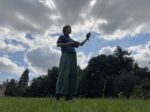
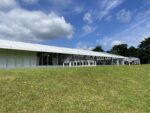
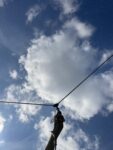
In the field that has been turned in to a parking lot for university graduation services, I link up my v-dipole, dongle and android. A maintenance man or security guard sitting in a blue van looks on with a bemused expression, but mostly he ignores me and talks on the phone. The air is warm for the first time in weeks and it is such a relief from the cold, rainy, at times torrential rain we have had in the U.K. Later in the afternoon I show my satellite image to SB, a physical geographer who specialises in studying past climates through tephra (volcanic ash). He points to the wavy line of the increasingly wobbly jet stream and explains how, with the poles warming faster than the equator, the difference in temperature and pressure that stabilises weather and holds the jet stream north is decreasing, causing the jet stream to curve and bend south more and more, bringing moisture laden air from the Atlantic to Northern Europe - this describes our recent weather experiences. Now that I’ve seen the curve of the jet stream with SB’s help I want to look back to all of the past imagery and try to spot it. Meanwhile, he says, ‘anywhere below 40 degrees (latitude) is burning’. Soph is just back from holiday and describes a level of heat in Croatia over the last week that was at the limit of their physical health. It doesn’t take much for heat to stress London- on my tube journey home, the air is so stifling that people are visibly haggard, some using makeshift fans and others flushed read and eyes closed, waiting for their train.
2024-07-16 12:15:09
Sasha Engelmann
Hackney Downs, London, United Kingdom
United Kingdom
NOAA-18
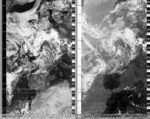
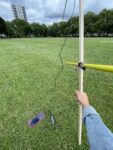
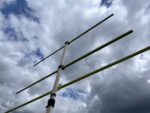
It poured last night, the kind of rain that quickly overwhelmed London's drainage system and caused pond-sized puddles on street corners and walkways. Somewhat fittingly, T and I were drenched in it while cycling home from a 'psychoanalysis and climate disaster' seminar at a pub in Finsbury Park. The conversation had been circuitous, and the speaker, a Lacanian psychoanalyst, had shared her research about the shift toward spiritual activism and intentional communities in Portugal testing different forms of spirit-informed collectivity. She kept saying that this research, or the research materials themselves, were 'embarrassing'. This was raised in the discussion- what is the root of our embarrassment when we talk about somatic practices or dance forms that give us more awareness of each other, or spiritual practices that give us room for wonder? Someone raised a theory from a source I can't remember that the earth has created beings with fully self-conscious brains - capacities to be embarrassed - in order to self-destruct on a planetary level. No reference was made to the many forms of human awareness and community that have not self-destructed, that are still trying to prevent destruction. I felt uncomfortable raising this point in the midst of so many unfamiliar, intimidating people, and because who am I, a white academic, to be the one to say 'aren't we forgetting indigenous lifeways and laws' when we theorise self-conscious self-destruction? I was reflecting on this during my satellite pass today. In the middle of it, two tall men in black t-shirts and knee-length shorts walked across the field staring at me so I smiled and waved. They came over and started asking questions. I was sitting on the grass holding my antenna upright and listening to the sound of the satellite on my Android phone. They approached very near but stayed standing, so I had to look vertically upward to see their faces. Their tall, looming shapes were outlined against the bright, cloudy sky. As I explained the tape measure Yagi and the passing satellite, one said, 'So are you an artist?' I keep wondering what sparks this question, as I have received it repeatedly over the last six months. Is it the fact that I use the word 'DIY'? Is it that I don't look like the type of person who is doing research or science?
2024-07-15 12:25:50
Sasha Engelmann
Hackney Downs, London, United Kingdom
United Kingdom
NOAA-18
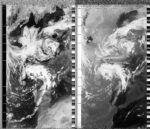
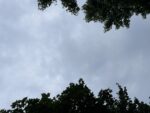
Low-hanging, medium-grey cloud with a light drizzle that grew into light rain as I knelt on the grass. The sound of a car-sized grass mower in the distance. Damp ground. Despite the un-summerlike conditions, the park was full of primary school children running races and exercising. As soon as one group saw me and came over to ask what I was doing, I became a magnet for others. One girl asked if I was 'traveling the world... with that thing [pointing to the antenna]?' I said in some ways, I was, but also, I was just listening to the world. Another small girl simply picked up my antenna and raised it to the sky, winking slyly at her friends, while the accompanying adult said 'you should ask first!'. But I appreciated their forwardness. As they huddled around, I showed them the growing satellite image and pointed to different countries so they could try identifying them. The answer was 'I don't know... ' until it turned out they did know. Among the parents or chaperones, several asked further questions and wanted to know how to follow the project. I had to hurry to pack up in between two waves of visitors to avoid disappointing anyone.
2024-07-14 12:40:13
Sasha Engelmann
Hackney Downs, London, United Kingdom
United Kingdom
NOAA-18
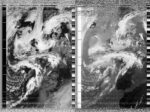
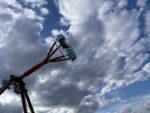
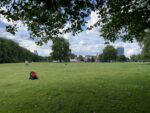
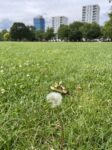
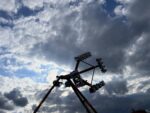
In 1989, Derek Jarman wrote of a day in July: "Lazy high summer. The drowsy bees fall over each other in the scarlet poppies, which shed their petals by noon. Meadow browns and gatekeepers flutter wearily across the shell-pink brambles disputing the nectar with a fast bright tortoiseshell. The bees clamber hungrily up the sour green woodsage. Drifts of mauve rosebay and deep yellow ragwort studded with orange and black burnt caterpillars" (Jarman, 1991: 107). This morning I read an article in the Guardian about the rate and long-term advancement of mass insect death. Based on research on the number of insects killed on the number plates of cars, the study says we have 90% fewer insects in the UK today than we did 100 years ago. During the satellite pass at midday, I note how the recently cut grass of the park has given way to a low layer of clover and dandelions, and how bees fly between the clover, only a couple centimetres above the grass, sometimes bumping into each other and weaving between the higher leaves of grass. Other than the random lazy fly, I don't see any other pollinators. Butterfly populations are especially affected this year, apparently, in part due to the very wet spring-summer that has washed out many of their homes. Derek was already aware of the changing climate in 1989, as he sometimes mentions the warming air and the 'hole in the ozone layer'. I wonder if he knew about mass insect death, though from his descriptions of the cottage garden in Dungeness, he was seemingly at home with a kaleidoscope of insect companions.
2024-07-13 12:52:06
Sasha Engelmann
Hackney Downs, London, United Kingdom
United Kingdom
NOAA-18
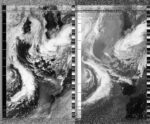
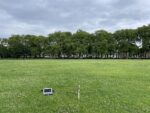
Grey, clouded, though lighter than yesterday. I noticed a thin, middle-aged man sat on a bench was watching me with my Yagi antenna. When I set my antenna down at the end of the pass, he walked over. He started with 'Just checking... you were tracking UFOs with that thing?'. I smiled and waved my hand in a 'sort of' gesture. As he turned to walk away I said 'I'm happy to show you what I've got?' and he veered back and sat on the grass near my laptop. We looked at the satellite image together. I pointed at the outlines of France, Spain and North Africa. He exclaimed 'Oh yeah, you're into weather!!' and he added 'I'm into weather too, always have been!'. 'How come?' I asked. He replied 'You can spell Rain, Cloud and Sun with my name... also Oak, Acorn... all the elements!' 'What's your name?' I asked. He replied 'Frances S ...' and a last name that I don't recall that begins with a 'K'. 'All the elements, then!' we laughed. He said 'Well keep lookin out for those UFOs' and I replied 'If I listen to any, I'll let you know!' And off he went, walking fast, south into the park. As I packed up I heard him yell to a man on a bike 'EH!! you have a GOOD DAY!!' As I walked home I thought about which elements I could spell with my name. By counting my middle name (Hildegard) I came up with 'shade', 'shine' 'hail' and 'snail'...
2024-07-12 10:20:14
Sasha Engelmann
Hackney Downs Funfair, London, United Kingdom
United Kingdom
NOAA-19
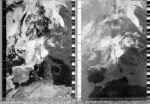
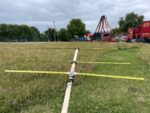
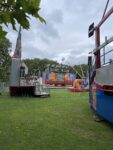
Low-pressing grey again. A feeling of melancholy. I'm missing Soph's presence on zoom calls and text channels. I go searching for the funfair in the northwest corner of the park. It has not yet been activated, but I can see people walking around inside, checking and testing things. I capture a satellite image with my Yagi antenna and Android phone, kneeling in the yellow grass. After the pass, I circle the perimeter of the fair, and notice that there is a line of trailer vans and mobile homes on the far side, facing the overground train tracks. Laundry is flung on the metal fence that divides the funfair from the park, or on small drying racks set up outside semi-ajar car doors. I hear a man speaking at an elevated volume on the phone. He says something like 'I thought I had 2 points! where are my points!' I realise, then, that the funfair is an entirely mobile operation: all the big machines are transported on two very large, glossy red trucks, but the real 'infrastructure' are the staff who likely follow in their vans and mobile homes. I wonder how many places they go. As I walk back to Downs Road I pass a couple walking their greyhound. As I pass I can hear the woman say to her partner 'Oh yes that's the lady with the...'
2024-07-11 11:35:36
Sasha Engelmann
Hackney Downs, London, United Kingdom
United Kingdom
NOAA-18
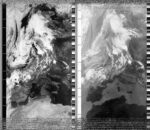
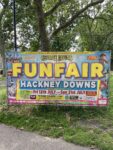
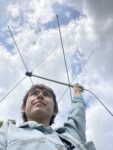
As we lift the blinds in the morning, T says 'what does it mean if the sky is blue!? I don't remember...' and we laugh at the fact that we have not seen a sliver of blue for what seems like weeks in the middle of the UK summer. A funfair is being constructed in Hackney Downs: the rides, swings and other contraptions make silhouettes against the blue on one side of the park. A man comes over to speak to me during the satellite pass, and comments 'you know I see people doing all kinds of things in the park - sitting, walking, like them [motions in the distance] but I never seen this!'. Later in the day, as we are cycling home from a pub on Columbia Road, the black outlines of the funfair machines, resting silently in the park, remind us of a horror film.
2024-07-10 12:25:14
Sasha Engelmann
Hackney Downs, London, United Kingdom
United Kingdom
NOAA-19
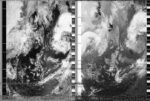
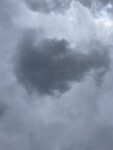
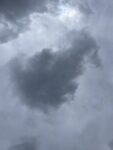
It is a grey, energy-less, dark-clouded day. My thoughts, however, are with the pale blue skies, swift winds and coastal swamplands of Buenos Aires as I re-read my field notes written during the month of fieldwork I carried out there last spring. As I make my way through my fast cursive handwriting, sometimes having to puzzle at words, I remember how breathlessly I wrote these notes, trying to record and remember everything. It mostly works. As I close-read, I am transported visually and sensually to Villa Inflamable, the community close to the centre of Buenos Aires that is the site of the research I am doing with a team of collaborators in Argentina. My colleague / friend Joaquin had taken me to VI after a morning spent on the rooftop of my other collaborator, Debora, eating pancakes and experimenting with radio antennas. There was not a speck or glimmer of cloud in the sky- and it was a wide open horizon. It took Joaquin and I only 12 minutes to drive from Debora's house to VI. My field notes read: "We arrived in the midst of heavy vehicle traffic - large tank trucks, mostly with Shell on them, entering and leaving the petrochemical facility. We passed to the right of a large sand dune - a sand production facility- there were thick clouds of dust in the air". From the open clarity of Debora's rooftop, it was a different experience being on the ground in VI. We walked around the neighbourhood with Claudio Espinola, a long-term activist and organiser in the community who also helps to ration water to families (the 'running' water is undrinkable, so families get a number of bottles of water per week). VI, like much of Buenos Aires, is on marshland, and we passed many pools of water and algae-covered ponds. The streets had been recently paved, but this had caused water-runoff problems and a man in a car told us he would prefer the dirt road if the sewage would not flood the streets. Later, as Joaquin and I left Claudia and made our way to an air quality monitoring station not far from the community, "We passed a plant that Joaquin suspects is where they began burning medical waste during the pandemic. It looked very old and dilapidated. Joaquin suspects that environmental regulations were relaxed during the pandemic to enable the repurposing of these kinds of incinerators. We also passed a smaller river - maybe 20m wide - that looked like slow-moving cement. There was on oil slick on top. Claudia had compared the river to cement too". I thought about who made the decision to start burning medical waste in an out-of-order incinerator in an already impoverished and environmentally stressed community like VI. I thought about what it takes to turn a river into cement. I also thought about the divergences in the experiences of people in this community and those only a few blocks away, somewhat sheltered from the 'weather' of the petrochemical facility. I thought about the 'weather' of Villa Inflamable, the weather of flammable. In a recent article on perceptions of air in Mumbai, two scholars write: "For the state, flammability is the result of the residents themselves. It is them, and their forms of work, that create fire risks, and so it is they who need to be removed. Residents, on the other hand, attribute causality to the gases that the garbage ecology itself produces. They are acutely aware of how the state has aligned blame in an opportunistic way with them rather than the material hazards of place, poverty and labor" (Tripathy and McFarlane, 2022: 12). From my fieldnotes alone (and without any experience of living in VI) the causality of the environmental toxicity in the neighbourhood is shockingly clear, yet my colleague Debora has written extensively of the 'labour of confusion' produced when residents of VI are told their environment isn't so toxic, or that nothing can be done about it. This is about perception indeed, and it is about whose perceptions are taken to mean 'truth' or 'causality' and whose are seen to trouble the order of things. I spend most of the day co-writing a draft chapter with Debora, returning in my memory to VI, trying to articulate in words the causalities and breathing relations at work there.
2024-07-09 12:01:53
Sasha Engelmann
Hackney Downs, London, United Kingdom
United Kingdom
NOAA-18
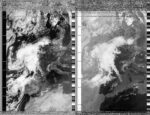
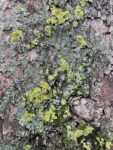
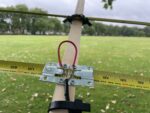
The gloomy weather in London persists. Yesterday, upon return home from the Isle of Wight, T and I joked that it felt like the summer was already over- our holiday had lasted two days, and now it is October again. It feels surreal to think that we still have some time in the Adriatic planned for later in the summer. It feels surreal to think of a 'normal' summer at all, at this point. I spend the morning organising open-weather finances in the university finance system called, fittingly, 'Agresso'. I manage to extricate myself from Agresso to go outside for a satellite pass- finding a slow, languid drizzle. Under a tree in the east-side of the park, my Yagi struggles to pick up the signal in the beginning of the pass, as if even the radio spectrum is sluggish, radio waves moving slower than the speed of light through this water-logged air.
2024-07-08 12:50:43
Sasha Engelmann
Ferry from Ryde to Portsmouth, The Solent Channel, United Kingdom
United Kingdom
NOAA-19

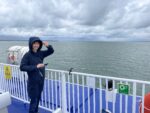
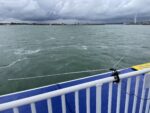
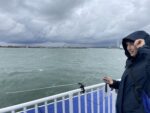
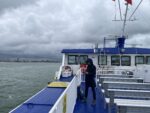
We made the 12:45 ferry to Portsmouth with one minute to spare, and opted for the 'sun deck' despite the total absence of sunlight. The deck felt more inviting than the humid, dark interior of the boat with airplane-like seats and sullen-looking people. We ate cheese and pickle sandwiches that neither of us liked very much. A NOAA-19 pass began just three minutes after the boat's departure. Though the maximum elevation was only 18 degrees to the west, I decided to try anyway, having never received a satellite image while moving in water! It worked far better than anticipated- I curled the legs of the V dipole antenna tripod around the metal railing, and a few minutes later the signal was ringing-in clearly. I wondered how my trajectory on the boat was affecting the image reception, if at all. A young man who had also come up to the deck asked if he could take a photo of me with his analogue film camera. He had travelled to the Isle of Wight for the weekend to 'see the stars'. Yet he also admitted to being 'very out of it' and having had 'little sleep'. He lamented the rise of Starlink and the other ways we are 'ruining the planet', and didn't say much more. When we approached the port, the clearly audible signal of NOAA-19 cut out sharply for a few seconds, so much so that I briefly wondered whether the satellite had stopped transmitting or glitched for these seconds. My experience of noise is normally a little 'softer', more like a gradient than a cut.
2024-07-07 12:31:03
Sasha Engelmann
Buddle Inn, Niton Undercliff, Niton, Isle of Wight, United Kingdom
United Kingdom
NOAA-18

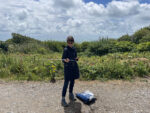
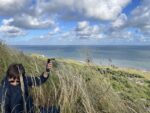
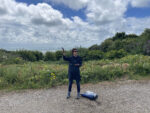
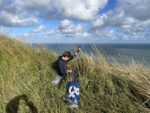
Crawww crawwww the crows spoke as they lifted and tumbled off their roosts along the cliff edge and fell into the strong westerly wind as if it was a blanket, finding shape as a flock seconds later. T and I were several hours in to a hike along the coastal path of the Isle of Wight and the silvery sea was shadowed by elaborate fast moving clouds. The weather forecast had predicted rain and yet we were in the sun most of the day. Our shoes and hands were speckled with the chalk that is characteristic of the island, and our legs happily tired. We learned about the local footpaths and the 'right to roam' across farmland. We also learned about the nettle and bracken that tower several metres high at points along the coastal edge, and send spikes into our ears and our shoes. We learned about some of the locals, too. Earlier in the afternoon, as we paused along the edge of a road to discuss our route, an older man tending a garden asked where we were from and if we needed help. We said we were from London. He said 'no your not!' so we had to explain further. The previous day, in the toilets of a seaside cafe, a bride-to-be looked at T and cried out very loudly and mockingly - 'are you a BOY or a GIRL??!' T found it funny. I ran through angry retaliations in my head for several minutes, then let it go. Back at the cliff, we lay in the tall grass as the crows swirled around us and T did some deep listening. I told T that I felt like falling off the cliff, it felt so tempting to follow the crows.
2024-07-05 12:56:19
Sasha Engelmann
Hackney Downs, London, United Kingdom
United Kingdom
NOAA-18

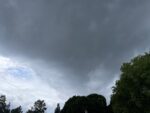
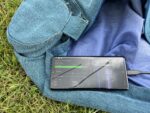
Last night on BBC weather, the presenter kept comparing current temperatures in the UK to what they 'should be' this time of year. The general trend was toward colder, wetter weather across England, Wales and Scotland. London's average in the first week of July is normally somewhere around 24 degrees C apparently, and it is currently rainy and dark, with a high of 18. As he reported this, the presenter even seemed a bit embarrassed, as if it was an awkward secret he was revealing. I met Muffin Man and a new miniature-Pomeranian rescue, Moonpie, out on the downs in the morning. When I went back out in the early afternoon, a very large, triangular rain cloud approached my ground station from the southwest side of the park, and fat drops began to fall on my antenna. They seemed unusually pendulous. I wondered whether warmer temperatures and the current humid conditions mean that drops grow larger before they fall.
2024-07-04 10:18:03
Sasha Engelmann
Hackney Downs, London, United Kingdom
United Kingdom
NOAA-19
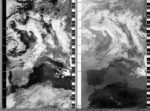
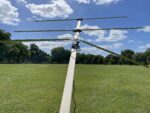
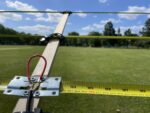
Finally the grey has passed and a crisp wind has blown away most of the low-hanging, misty clouds. The air has a sharp chill, but one that will fade soon, I suspect. I am reminded of Derek Jarman's weather note on June 4th 1989 (from his diaristic book Modern Nature) which, though clearly of another time, place and month, describes today's weather perfectly: "The billowing white flowers along the shore are gone; but the mountainous white clouds in the blue sky and the horses breaking across a silvery sea cheer their memory to the echo. Today wind and sunlight fill the landscape with laughter. An old window opened in the wind and sent the cobwebs flying. The grasses are clapping - even the seagulls loop the loop".
2024-07-03 10:29:29
Sasha Engelmann
Hackney Downs, London, United Kingdom
United Kingdom
NOAA-19
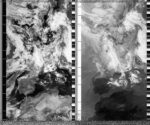
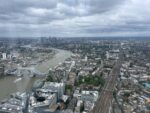
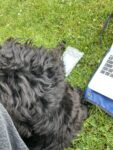
It is another grey, misty and cold-ish day in London. I spend the morning working and take a brief break to capture a satellite image. A curly haired black dog tackles me and rolls around on my laptop as I am mid-pass. His owner looks mortified but as soon as I say it's not a big deal he becomes interested in my antenna, and it turns out he used to be an engineer, working with Radar. We don't speak long. Later in the afternoon, I see the weather from the seventieth floor of the Shard (a sneaky birthday-week adventure with T, who has wanted to go to the top of the Shard for years but is always too anxious of the elevators). We rise sixty floors in what feels like five seconds, our ears popping. At the top, T and I carefully approach the knife-edge, holding on to the metal beams for reassurance. After a few minutes, though, we have our foreheads pressed against the glass gazing in every direction. A stranger offers to take photos of us. Though the view might be more stunning on a sunny day, the changeable clouds and shifting rain are spectacular, and we try to time how long a rainy cloud takes to pass over London. It sort of dissolves rather than making it the whole way. There are only a few other people, and so plenty of space to circle all edges and study all perspectives. Descending, we go on a hunt for an ivy-coloured wall on an old building at Kings College that we could see hidden a few blocks away from St Thomas' street. Once we find the wall, we spend a few minutes admiring the density of the ivy, its even spread and growth over red brick, nearly engulfing the entire building.
2024-07-02 10:41:06
Sasha Engelmann
Hackney Downs, London, United Kingdom
United Kingdom
NOAA-19
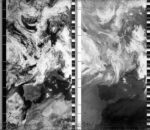
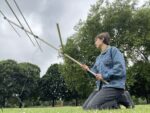
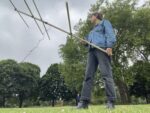
The day starts cold, gray and misty. During the satellite pass, I feel chilly in my Mom's flannel-lined denim jacket, jeans and boots. How is this the second of July, I think. In the slow-loading satellite image, the sun glints tantalisingly, catching its own reflection over the Mediterranean. I am wondering where Soph is at the moment, as they left for a two-week holiday on Sunday. I think somewhere in Croatia, soaking up sunrays and salty air. Thinking about it makes my heart hurt, both with happiness that Soph is there on holiday, but also with a feeling of deeply missing the Adriatic and especially the small bay called Zaraca, near the village Gdinj where my Baba grew up on a remote part of the island of Hvar. Is it possible to miss an atmosphere, or a weather pattern? Is it possible to be nostalgic for places, less through their material surfaces and more through their elements? Having spent so many long summers in Zaraca as a child, having climbed the windy road that goes from the bay to the sparsely populated village Gdinj, with its fig trees and olive groves, with its tunnel spiders catching impossible flecks of dew in the dry landscape and epic cumulonimbus clouds dancing over the Karst rock of the mainland, and wtih its slantwise sunlight that remains until the last drop (since the road climbs on a south-facing slope) I feel so entwined with this weather. It is perhaps easy to say on a day like this in London, as I shiver through my trousers in the first week of July. Yet I think there is something beyond the beauty of Hvar and the Adriatic Sea that I am missing so much. Maybe it's a direction I will always turn.
2024-07-01 10:57:13
Sasha Engelmann
Meadow near the Biological Sciences Bee Apiary, Royal Holloway University of London , United Kingdom
United Kingdom
NOAA-19

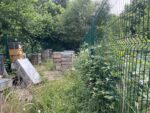
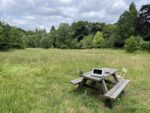
Bees, flies, ladybugs and other insects buzzed around my ground station, located near to the Biological Sciences bee apiary in a meadow on the campus of Royal Holloway. One long-winged fly, looking like a cross between a grasshopper and a moth, landed on my keyboard. Purple-pink cornflowers and daisies bloomed abundantly in the uncut grass. I remembered Jaime Sebastians' story that he had recorded the sound of a NOAA satellite together with the chirping of crickets or cicadas, and he could 'see' the chirrups in the resulting image. I resolved to return to the apiary one day and attempt a recording of both an orbiting satellite and honeybees.
2024-06-30 18:05:38
Sasha Engelmann
Hackney Downs, London, United Kingdom
United Kingdom
NOAA-15


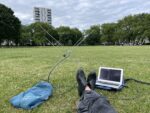
'So humid' proclaims T as we walk to Hackney Central to catch the overground to Stratford on a rare trip to the Westfield Mall. The air is misty with a light rain, though it is just as warm as it has been under bright sun for the last week or so. On the overground, two Moms are taking a large group of young boys paintballing. We arrive at the Mall hoping to be early enough to evade most crowds, but we find we are not the only people waiting for the Adidas store to open at noon. As soon as the metal gates have been pulled back, throngs of people enter, and it is almost impossible to locate and calmly try on shoes. We persevere in JD, Footlocker and Office before both me and T begin to feel physically unwell from the press of the crowds, the 'hall of mirrors' that is every sports apparel store, the stress of finding our way around, and the ultra loud grime tracks that are booming from every corner (though some lyrics have clearly been redacted for children's ears). We flee after no more than 45 minutes and head home, shoeless.
2024-06-29 12:27:48
Sasha Engelmann
West Hackney Recreation Ground, United Kingdom
United Kingdom
NOAA-18

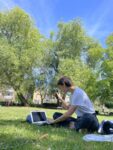
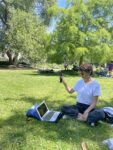
Dalila and I were relaxing on the grass of the garden around the corner from the Stoke Newington Farmer's Market (while I held up my V-Dipole antenna to casually capture a NOAA 18 pass) when a tall man suddenly interrupted us, asking what I was tracking. Within seconds he had laid himself down on the grass between me and D, head towards my laptop, and was asking a flurry of questions. I appreciated his curiosity, but the way he had just placed his body in the middle of our private conversation was annoying. It transpired that he was an academic in the sciences, though I can't remember the exact field, employed by Queen Mary University. When I mentioned later in the conversation that I work at Royal Holloway, he immediately asked "And you live in East London? Why don't you work at Queen Mary?!". I said I would love to have the option of a job at Queen Mary, things weren't that simple! Another tall man came over a few minutes later and asked similar questions, while the first one loaded the open-weather website on his smartphone. Yet as soon as he read the blurb, he exclaimed to his friend "Oh this is not for us... it's a 'feminist experiment'....". I replied actually, it was exactly for them. "I'll have to tie my hair back" said the first man. The second seemed to understand what I had said and backed me up. But at this point my feeling in speaking to them had completely changed- they had now separated me and D, and taken up a long stretch of time, while making remarks like the above. I decided to close my laptop.
2024-06-30 11:34:24
Soph Dyer
Hanging out of the window, sun on my face, Austria
Austria
NOAA-18

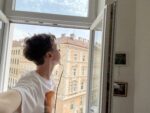
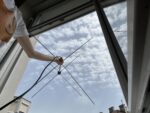
I woke relieved to see a cloudy sky and even a few drops of rain. By eleven o'clock the sky had mostly cleared and the temperature is rising again. I feel the heat on my face as I lean out of the window to receive this image. My left arm turned to jelly as I tried to maintain the pose, thrusting my antenna as far East as possible. The Kestrels nesting in the building across the street made frequent alarm calls. Two flying ants danced around the stone work below me. It's Sunday, but N and I leave for Split by train tonight, so I am working a funding application.
Sasha, I know that my contributions have been inconsistent recently. The pain I have weathered for the last year has surely left it's mark. It is 37 days until the operation.
2024-06-28 09:06:47
Sasha Engelmann
Hackney Downs, London, United Kingdom
United Kingdom
NOAA-15
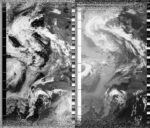
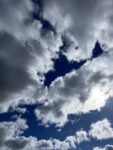
Last night I finished 'The Well of Loneliness' by Radclyffe Hall, first published (and then banned because of its lesbian content) in the UK in 1928. It follows the life of Stephen Gordon, a woman from a rich family who, in the words of the time, demonstrates "sexual inversion" from an early age. Her life story moves from the rejection of her mother and expulsion from her home in the English Countryside, to driving an ambulance in World War II, to moving to Paris where she can live a little more openly with her partner Mary. To find places where they can be and dance in public, Stephen and Mary visit 'the bars' in Paris where queer people can go without fear of prosecution, yet these places are also full of despair, substance abuse and sadness. At the end of the book, and though it breaks her heart, Stephen pushes Mary away from her, as she sees that Mary could have the possibility of a 'normal' life with a man called Martin. In the last few lines of the book, Stephen, in anguish, pleads to God: "give us also the right to our existence!".
I think of how much has changed in the 100 years since the publication of The Well. I can live together with T, I can live an openly queer life, and I can freely access and read this book. Yet the 'pull' of 'normal' has not lost its strength. Society's 'straightening devices' work in new and different ways today, but they still work. Living obliquely or 'slantwise' requires unusual and surprising effort at times. And in an even odder development, queer identities and politics are now being used to 'pinkwash' the actions of corporations or governments committing acts of violence. In many ways, and in Ahmed's terms, society today might be oriented 'to' different things on the surface, but in many ways it is still oriented 'around' the same 'straightening' logic.
2024-06-28 12:01:02
Soph Dyer
In the heat of Augarten, Austria
Austria
NOAA-18

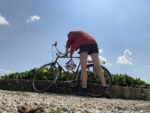
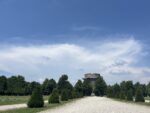
As I write this weather note there is a warm wind and the temperature has dropped. In the park, I could see large cloud to my West. It might have been a cumulonimbus but its top was cirrus-like and its shape not well defined. The heat is waking me early. This morning instead of rising, I read the news in bed. President Biden has performed poorly in a debate about Trump, unnerving even his allies. The American Democratic Party is panicking. If the situation wasn't so terrifying, it would be funny. Writing this note is taking longer that is should as I feel so drowsy. I have drunk a mate tea to wake-up, however it seems to be having opposite effect. The wind has dropped and the sun is shining again. I could fall asleep at my desk.
2024-06-27 20:55:10
Soph Dyer
Sitting on the window ledge, Austria
Austria
NOAA-19

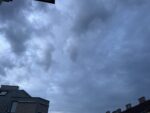
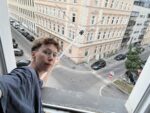
It's a warm evening and the street is loud. Starlings, children, adults shouting, car tyres screeching. The humidity has felt oppressive. As I recorded the image the sky was clouding over. The clouds are dramatic, they look high defintion and high contrast. They are moving quickly. I felt one large drop of rain on my way home, but that's it so far.